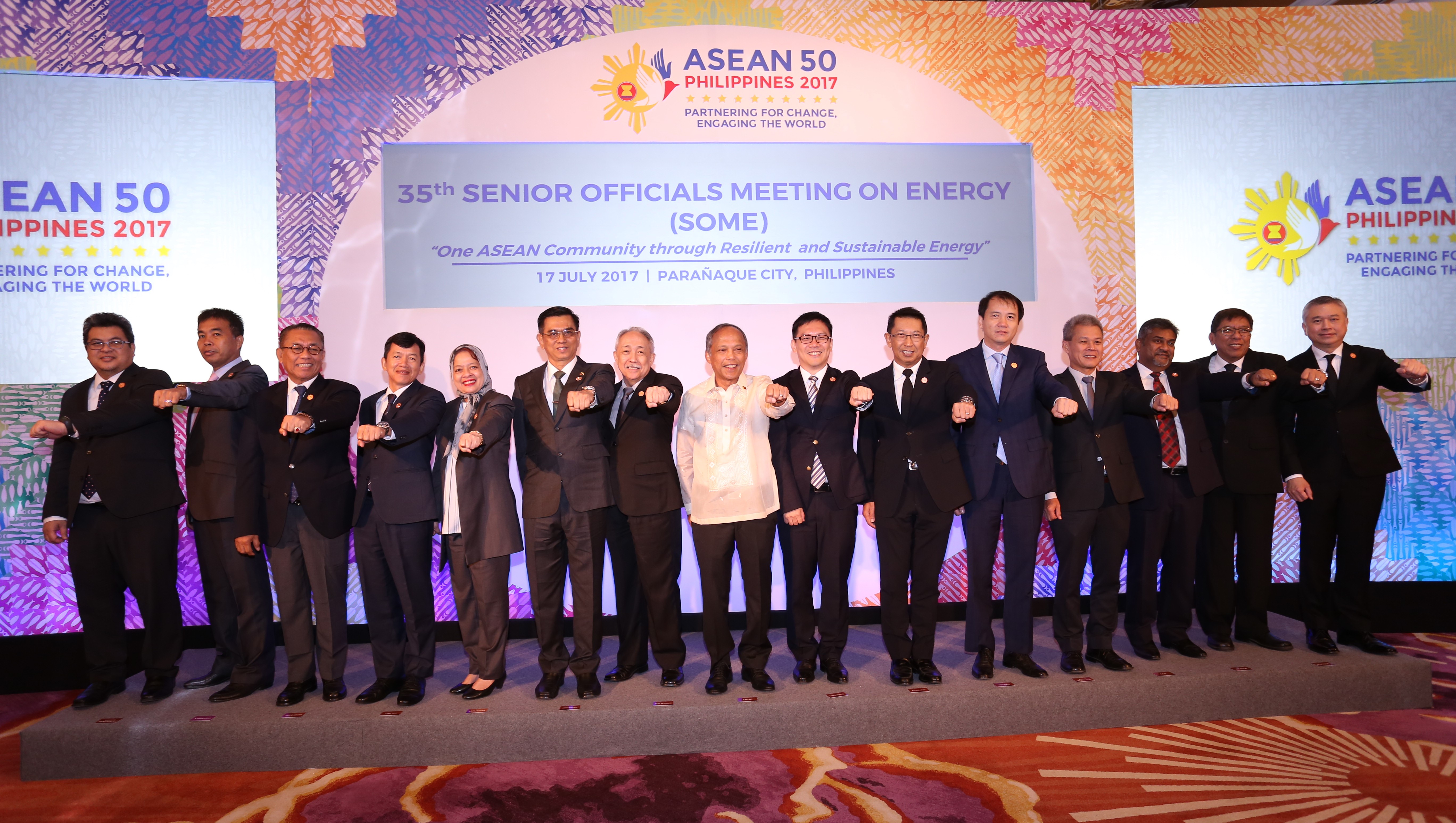
EMPOWERING A UNIFIED ASEAN: Philippine DOE Secretary Alfonso Cusi together with the ASEAN Senior Officials on Energy animated the E-Power Mo! pose during the 35th ASEAN Senior Official Meetings on Energy at Okada Manila, Parañaque City. In photo with Sec. Cusi (center) are (L-R) Dato Jamain Julaihi (Brunei Darussalam), Sodavath Chan (Cambodia), Andy Noorsaman Sommeng (Indonesia), Khamso Kouphokham (Lao PDR), Badriyah Ab malek (Malaysia), Htein Lwin (Myanmar), DOE Usec. Jesus Cristino Posadas (Philippines), Jonathan Kok Chye Goh (Singapore), Areepong Bhoocha-oom (Thailand), Phuong Hoang Kim (Vietnam), Tran Dong Phuong (ASEAN Secretariat), Sanjayan Velautham (ACE), Syaiful Bakhri Ibrahim (HAPUA) and Nopporn Chuchinda (ASCOPE).
(Manila, Philippines). Energy Secretary Alfonso Cusi said today (17 July) that the Duterte Administration is working hard to address the resiliency of energy systems and infrastructure and the reasonability of electricity rates in the Philippines as he opened the ASEAN 35th Senior Officials Meeting on Energy (SOME) at Okada Manila.
Cusi congratulated the organizers of the week-long series of meetings that form part of the events being hosted by the Philippines in celebration of the 50th founding anniversary of the ASEAN (Association of Southeast Asian Nations).
"We are tasked to ensure energy security for the region to sustain our respective domestic economies. This becomes more urgent as we move towards the realization of an ASEAN Economic Community through greater collaboration," Cusi told the delegates.
Cusi cited the 10-year ASEAN Plan of Action on Energy Cooperation (APAEC) 2016-2025 as the region sets to achieve enhanced energy security, accessibility, affordability and sustainability.
On the home front, Cusi said government's "Ambition 2040" aspires to transform the Philippines to an upper middle-income economy in which Filipinos get to enjoy a comfortable and secure existence.
He added that the Philippine is moving to bring about a "golden age of infrastructure" through a "Build, Build, Build" infrastructure plan which is part of "Dutertenomics."
"In support of this infrastructure plan, the Philippines would need additional capacity of 44,000 MW up to 2040. To do this, the Philippines is pursuing fuel and technology neutral and balanced environmental protection goals and socio-economic growth,” Cusi told the delegates.
"Along this line, we have set our sights on an optimal demand behavior-based fuel mix with 70-20-10 share of baseload, mid-merit and peaking capacity requirement to support our growing economy," Cusi said.
The challenge is to increase energy supply specially electricity, both for grid and off-grid areas, he stressed.
"Our ultimate vision is to provide power of choice to our consumers," said the Energy Chief.
"We will implement policies that would increase our supply and make our electricity market more competitive while also addressing the perennial concerns of system inefficiencies."
Cusi invited energy sector players to come up with innovative solutions and dynamism, thus "increasing supply and ensuring more competition in the sector."
He pointed out that Executive Order (E.O.) No 30 signed by President Rodrigo Duterte on June 28 created a task force to establish a simplified approval process for permits and licenses to fast track the implementation of big-ticket energy projects.
“The EO instructs government agencies to act on applications of energy projects within 30 daysupon complete submission of requirements,” Cusi explained.
Also, a new policy initiative of the DOE now subject to public consultations is institutionalizing disaster resilience in the energy sector by strengthening energy systems and facilities, quickly restoring damaged facilities and providing alternative energy sources during calamities.
Given the archipelagic nature of the country, “the DOE will pursue distributed electrification for currently off-grid island provinces through independent mini and/or micro grids served by local indigenous power sources like run-of-river and biomass,” said Cusi.
This is to mitigate the risk of extensive outages that may be sustained in the transmission lines and distribution networks due to natural and human-induced calamities like earthquakes and typhoons that are of increasing frequency and intensity lately.
"Major activities under this policy also include the implementation of the ‘Build-back Better’ principle in reconstruction and rehabilitation of infrastructures, improvement of operational and maintenance standards and practices, as well as resiliency standards for new energy facilities," said Cusi.
###
